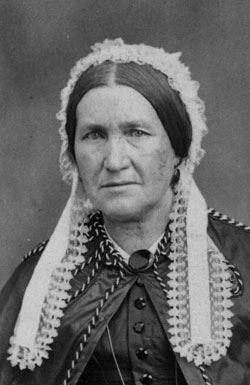
Presendia Kimball is not one of our more well known names in history, nevertheless, there are wonderful lessons to learn from her life and her writings. Her biography is found in the Women’s Exponent (a serial starting on 1 June 1883), so much of the telling comes from Emmeline Wells, who knew her well. However, it is Presendia’s diary, and recordings, that make this life notable and remarkable.
Presendia Lathrop Huntington was Zina D. H. Young’s older sister (by 11 years). She was married and living away from home when she first heard the gospel. She immediately recognized the truth of it and sought baptism; as well as her husband, and much of her family.
11 years). She was married and living away from home when she first heard the gospel. She immediately recognized the truth of it and sought baptism; as well as her husband, and much of her family.
She witnessed the glories in attendance at the Kirtland Temple dedication. She records how she and her sister, Zina, were in the temple praying with many others. “While the congregation was thus praying; we heard from one corner of the room above our heads, a choir of angels, singing most beautifully. They were invisible to us, but myriads of angelic voices seemed to be united in singing.”
At another time, “We were also in the Temple at the Pentecost. In the morning, Father Smith prayed to open the meeting. That day the power of God rested mightily upon the Saints. There was poured out upon us abundantly the spirit of revelation, prophecy, and tongues. The Holy Ghost filled the house.”
Presendia lost two sons early on, and while in Missouri her husband lost his testimony. Why is it that so many of these strong women kept their testimonies while their husbands lost theirs? The answer to this dilemma was polygamy. She was later given in marriage to Heber C. Kimball.
Her brother, William, was imprisoned in Liberty jail with Joseph and Hyrum. She visited these good brethren twice in that awful place. “While in prison, the brethren were presented with human flesh to eat. My brother William tasted before the word could be passed from Joseph to him. It was the flesh of a colored man.”
After a visit, the prophet Joseph wrote her a letter, thanking her for her company. He writes in part, “I was glad to see you. No tongue can tell what inexpressible joy it gives a man to see the face of one who has been a friend, after having been enclosed in the walls of a prison for five months. My heart bleeds continually when I contemplate the distress of the Church. O that I could be with them! I would not shrink at toil and hardship to render them comfort and consolation. I want the blessing once more to lift my voice in the midst of the Saints, I would pour out my soul to God for their instruction. It has been the plan of the devil to hamper and distress me from the beginning, to keep me from explaining myself to them. Our trouble will only give us that knowledge to understand the mind of the ancients. For my part I think I never could have felt as I now do if I had not suffered the wrongs which I have suffered. All things shall work together for good to them that love God.”
At one time, Presendia was riding in her carriage with her little boy, when she came upon some men she knew meant harm. They stopped their horses and watched as she rode by. She forced herself to ride at a normal pace, but was very frightened by the encounter. Only days before, a man had been shot while riding along that very road.
In Emmeline’s words, “Time passed and the Saints had nearly all left for the west, Sister Presendia felt as if she was at the mercy of the mob, and indeed plans were laid to destroy her. One night a subterfuge was invented to decoy her out of doors in the dark; she felt a great fear come over her. Presendia realized the danger that surrounded her and prayed for help. She was very soon rescued.
In the Spring of 1856, during the grasshopper famine, everyone lived on half rations. Presendia records, “I asked the Lord in prayer to take away my appetite and give me strength to keep up without it, so that I might give my rations to the poor children who had nothing. Strange as it may seem the Lord heard and answered my prayers. I was enabled to keep up my usual strength with scarce any food at all, and the desire of my heart was granted me that I might impart my share to those who had none. In that dreadful time many were the scenes of distress pitiful to relate, and some were not able to endure this severe test of their faith and apostatized from the Church and went away. Some lived on nothing but roots and greens for weeks together. Verily it was a time of trial that pierced men’s souls; to hear one’s children crying for bread without a morsel to give is something that even strong men shrink from, and the tender hearts of mothers in times like these are torn with anguish.”
Presendia’s diary has such detail in it, I am grateful to know “what it was really like” for the Saints during these difficult times. The strength these women exhibited amplifies their testimonies and gives us hope in our day.